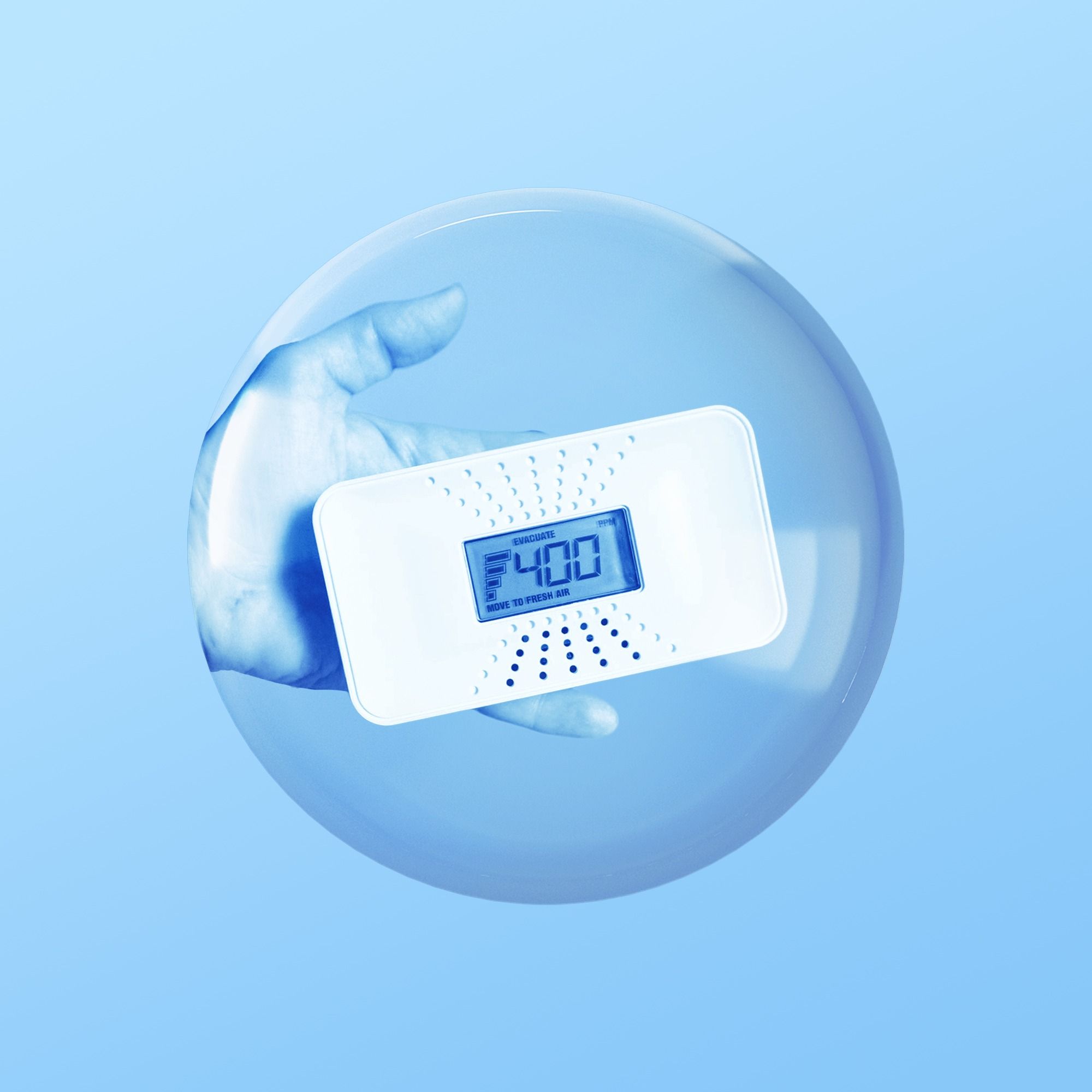This Travel Device Could Save Your Life
Press play and read along
Transcript
Speaker 1 Taking care of your skin is a personal daily ritual. No matter what regimen works best for you, it's important to remember that great skin care doesn't have to be complicated.
Speaker 1 With Clinique's classic three-step routine, fresh, radiant skin is as easy as one, two, three.
Speaker 1 Clinique's iconic trio of products used to cleanse, exfoliate, and moisturize, is specifically created to address your skin's needs and provides a refreshingly simple solution for maintaining beautiful, resilient skin.
Speaker 1
Twice a day, every day. Great skin starts here.
Visit clinique.com to learn more.
Speaker 2 I'm Christine Seer-Clissette. I'm Kyra Blackwell.
Speaker 3 I'm Rosie Guerin, and you're listening to The Wirecutter Show.
Speaker 3 Hey there, it's Rosie. I realize this might sound hyperbolic, but today's bonus episode could quite literally help save your life.
Speaker 3 For most of my life, I've harbored an irrational fear of death by carbon monoxide poisoning.
Speaker 3 I call it irrational because we always had carbon monoxide detectors in the home and my parents were fastidious about changing batteries.
Speaker 3 I've carried that diligence to every apartment I've ever lived in, ensuring I'm always living under the protection of working smoke and carbon monoxide detectors, assuming I'm good.
Speaker 3 Fast forward, a few months ago, when Christine Christine made a passing reference to traveling with a portable carbon monoxide detector, it had never even crossed my mind.
Speaker 3 New fear immediately unlocked. Carbon monoxide is a colorless, odorless gas given off when fuel, like natural gas or propane, burns.
Speaker 3 CO poisoning is a leading cause of poison-related deaths in the U.S., and there are surprisingly few laws requiring CO detectors in short-term lodging.
Speaker 3 In the spring, you may have read about retired Yankee player Brett Gardner's 14-year-old son Miller, who died of carbon monoxide poisoning in Costa Rica.
Speaker 3 Although the risk of getting sick or dying from CO poisoning while traveling may be relatively low, there is a very simple way to get some peace of mind.
Speaker 3 You may be thinking about your fall and winter travel plans, and we thought this would be a great time to discuss why you might want to bring a portable CO detector on your next trip.
Speaker 3 Christine is going to talk with one of Wirecutter's travel writers, Maria Ottelman, about how to avoid carbon monoxide poisoning when traveling.
Speaker 2 We'll be right back after a quick break. Stick around.
Speaker 4
As a small business owner, you don't have the luxury of clocking out early. Your business is on your mind 24-7.
So when you're hiring, you need a partner that works just as hard as you do.
Speaker 4 That hiring partner is LinkedIn Jobs. When you clock out, LinkedIn clocks in.
Speaker 4 LinkedIn makes it easy to post your job for free, share it with your network, and get qualified candidates that you can manage all in one place. Post your job.
Speaker 4 LinkedIn's new feature can help you write job descriptions and then quickly get your job in front of the right people with deep candidate insights. Either post your job for free or pay to promote.
Speaker 4 Promoted jobs get three times more qualified applicants. At the end of the day, the most important thing to your small business is the quality of candidates.
Speaker 4
And with LinkedIn, you can feel confident that you're getting the best. Find out why more than 2.5 million small businesses use LinkedIn for hiring today.
Find your next great hire on LinkedIn.
Speaker 4
Post your job for free at linkedin.com slash wirecutter. That's linkedin.com slash wirecutter to post your job for free.
Terms and conditions apply.
Speaker 5
Wayfair loves fall. The crisp air, the cool nights, and of course, the seasonal lattes.
And as your trusted destination for all things home, Wayfair's got everything you need to cosify your space.
Speaker 5 From comfy recliners to warm bedding and autumn decor. Wayfair even has espresso makers, so you can make that latte at home.
Speaker 2 You know the one.
Speaker 5
Head to Wayfair.com today to shop curated collections of easy, affordable fall updates. That's w-a-y-f-a-ir-r.com.
Wayfair, every style, every home.
Speaker 2
Welcome back. I'm here with one of Wirecutter's travel writers, Maria Ottelman.
Welcome to the show, Maria.
Speaker 6 Hi, thanks for having me.
Speaker 2 This episode, we're talking about travel and carbon monoxide poisoning.
Speaker 2 This topic, Maria, really hits home for me because several years ago, a family of four died of carbon monoxide poisoning in a condo complex where I had actually just stayed a couple months before with my family of four.
Speaker 2 And when I stayed in this same complex, our water heater went out in the middle of the day. And fortunately, the windows in our unit were were all open and there was lots of air circulating.
Speaker 2
And the manager came over and took care of it right away. But this other family was not as fortunate.
They were all sleeping and their windows were closed and they died. It really sent me down.
Speaker 2 a spiral. I started doing a ton of research on how common carbon monoxide poisoning is and it happens more frequently than I had ever really considered before.
Speaker 2 I also learned that a lot of lodging options like Airbnbs don't automatically have a carbon monoxide detector in them. So, Maria, we're not here to, you know, dabble in fear-mongering or anything.
Speaker 2 This is not the biggest risk you might face when you're traveling, but it is a risk. And I would like to know how big of a risk it is.
Speaker 2 You know, I have my personal biases after my experience, but could you put it into context of, you know, how risky is CO poisoning when you compare it to something that is maybe pretty common, like a car crash, or maybe very, very rare, but gets a lot of publicity, like something like a shark attack or a lightning strike?
Speaker 6 There's a quick answer, and then there's like a really long answer.
Speaker 6 So the quick answer is just carbon monoxide poisoning generally is uncommon compared to a car accident, but much more common than something like a shark bite.
Speaker 6
But for travel specifically or deaths or poisonings in lodgings, it's really hard to know exactly. There's no national tracking of deaths or poisoning in lodging.
So we do know some things.
Speaker 6 We know that in general, carbon monoxide poisoning is one of the leading causes of poison-related deaths in the U.S. So there's at least 430 deaths annually and 14,000 hospitalizations.
Speaker 6
And that's just unintentional, non-fire-related incidents. And I will say hospitalizations is also important.
I used to think it was sort of like you died or survived. That's not the case.
Speaker 6
Even if you have mild or moderate symptoms up front, you can have long-term neurological damage. So hospitalizations are also important number.
Compare that with car accidents in the U.S.
Speaker 6
About 40,000 people die every year from car accidents. And to compare with shark attacks, last year there were 28 unprovoked shark attacks in the U.S.
and one death.
Speaker 6 So you can sort of see where it fits on the scale generally.
Speaker 2
Right. This is more dangerous than the most rare risks that you might face when traveling.
Yeah.
Speaker 6 And for some reason, it's like, I think about shark attacks more than carbon monoxide poisoning. But for travel specifically, there's not a lot of data.
Speaker 6 The best data I could find was this 2021 study that analyzed data from the National Fire Incident Reporting System, and that found 170 carbon monoxide-related incidents.
Speaker 6 at hotels each year in the U.S.
Speaker 6 The study concludes that this might be like a low-end estimate of the public health risk because
Speaker 6 first, it only includes commercial hotels and motels. So it doesn't include anything like vacation rentals like Airbnbs.
Speaker 6
It's only U.S. data and it doesn't include every fire department.
And it doesn't include data from non-fire department EMS services.
Speaker 6 The point is, it could be somewhat bigger public health issue than we understand.
Speaker 2 Can you just elaborate a little bit on what happens exactly when your body is exposed to carbon monoxide. How does it make you sick?
Speaker 6 When you're suffering from carbon monoxide poisoning, the carbon monoxide starts to replace the oxygen in your blood. There's two really scary things about this.
Speaker 6 The first is that carbon monoxide, it's colorless, it's odorless, it's tasteless, it's basically invisible to you.
Speaker 6 And the second thing that's scary, which I learned while reporting this piece, was that knowing the symptoms might not actually be that useful.
Speaker 6 It might give give you a false sense of comfort, like you'll have this knowledge if you're being poisoned.
Speaker 6 So common symptoms they say include like headache, dizziness, fatigue, nausea, stuff like that. And a lot of people say it feels like getting the flu.
Speaker 6 And it's also similar to other travel related illnesses like food poisoning or maybe you've gone out and had a little too much to drink.
Speaker 6 One woman I talked to said something that really stuck with me, which is if you have a headache, you're not going to call the fire department.
Speaker 6
And if you think you have the flu, you're probably just going to stay in your hotel room. I mean, it's happened to me on a trip.
I thought I had food poisoning.
Speaker 6 I stayed in my hotel room for three days. If it had been carbon monoxide poisoning, that would have been the least helpful thing I could do.
Speaker 6 I would get more confused and I'd be less and less likely to get out of my situation as time went on.
Speaker 2
Just staying in your room might make it worse. Okay, so you're saying it's kind of hard to know whether you're being exposed to carbon monoxide.
It's odorless. It's invisible.
Speaker 2 The symptoms are very similar to other types of illnesses. But if you do suspect that you are being potentially exposed to CO, what should you do?
Speaker 6
The bottom line is fresh air. So get to fresh air, leave the house.
or the hotel, whatever, and get outside, call 911.
Speaker 6 If you have symptoms, get medical help and make sure someone like the fire department clears the premises before you go back.
Speaker 6 If you have someone who can't get out of the building for whatever reason, open windows, get fresh air. If you know what's causing the problem and it's safe to turn it off, you could do that.
Speaker 6 But like the bottom line is fresh air.
Speaker 2 So in this piece that you just wrote, you recommend traveling with a CO detector.
Speaker 2 Shouldn't most hotels and Airbnbs and other short-term lodging have CO detectors? Why don't all these places have CO detectors just like they might have smoke detectors?
Speaker 6 Yeah, this was the other eye-opening thing that I discovered while writing this piece because I sort of thought, is it overkill to travel with a carbon monoxide detector?
Speaker 6 Turns out that there are actually not a lot of laws that require carbon monoxide detectors and hotels and other short-term lodging. So
Speaker 6 it's sort of hard to track all the laws in the U.S. But one thing we do know is that only 14 states have state statutes mandating carbon monoxide detectors and temporary lodging.
Speaker 6 And even those are not always comprehensive, like it might only be new buildings or certain rooms in those hotels.
Speaker 6 As for vacation rentals, sites like Airbnb don't require hosts have carbon monoxide detectors. They do encourage it.
Speaker 6 You can actually search listings based on whether the Airbnb has a carbon monoxide detector.
Speaker 6 Though, of course, the reality may be different than the listing that you'd want to check that it actually has that detector and that it's still working.
Speaker 2 I always actually look at that field in Airbnb when I'm renting a place after this incident in Mexico, because I was totally floored and surprised that the unit I was in didn't have a carbon monoxide detector.
Speaker 2 And then I realized how uncommon it was in general. I thought every
Speaker 2 Airbnb in the United States would have them. And then I learned pretty quickly after doing my research that it doesn't.
Speaker 2 So I'm curious if there are certain types of lodging that have a higher risk of problems with carbon monoxide.
Speaker 6 Yeah, because we don't have a lot of data just generally on this. We don't really know.
Speaker 6 One thing I know about older buildings is that actually some of these laws that require carbon monoxide detectors only cover new buildings. So that could be a concern.
Speaker 6 And also, older carbon monoxide detectors weren't required to have end-of-life signals. I think it was maybe before 2010.
Speaker 2 And just to make sure I'm clear on that, that means like it beeps when it's about to die.
Speaker 6
Right. Now carbon monoxide detectors require that there's some chirping before it dies so you know.
So older alarms didn't have those.
Speaker 6 So it's, I think, more likely that those alarms could have died without anybody noticing. They look like they're there, but they're not working.
Speaker 2
Okay, so that's also like a good note. If you have a carbon monoxide detector in your home and it's old, you might want to check it.
All right.
Speaker 2 So what are the most common sources of CO in vacation lodging?
Speaker 6 So you want to think about in your home, lodging anywhere, any appliance that burns fuel. So the issue is if it's not well ventilated, then carbon monoxide can build up.
Speaker 6 So in hotels, people have died because of pool heaters, faulty pool heaters, ventilation systems, boilers, blocked fence, that kind of thing.
Speaker 6 If you're renting a house, like a full house, you should think of all the things you think about in your own home.
Speaker 6 So appliances like furnaces or gas stoves, some clothing dryers, even grills, these could all be the culprit. One big concern is cars running in attached garages.
Speaker 6 And there's a new concern now with keyless ignitions because you might not realize the engine is still on, especially if you are hard of hearing.
Speaker 6 One thing that's not travel-related, but is so big, I thought I would mention it, is that portable generators alone cause 70 to 100 carbon monoxide-related deaths a year.
Speaker 2 Whoa.
Speaker 6
Yeah, it's huge. So these have to be used outside, but not just outside in well-ventilated areas, like 20 feet from the windows and doors.
They have to be used far away. So that's important.
Speaker 2
Wow. So that's a note for your emergency preparation situation.
Make sure you've got a lot of ventilation with your generator.
Speaker 2 So I have a plug-in CO detector in my apartment, and I know some of the smoke detectors that Wirecutter recommends also have built-in CO detectors. So those are the types that.
Speaker 2 you know, you might have in the home that you live in full time. What do you recommend traveling with?
Speaker 6
Well, first, you could totally use one of those plug-in detectors from your house. They aren't that big.
It could be really convenient.
Speaker 6 If you have a house with multiple detectors, you're renting a vacation home and you want to use multiple there, you could just bring those.
Speaker 6 The only problem with that is you kind of have to pack them last minute and then like reinstall them immediately when you get home.
Speaker 6
So I think it's pretty convenient to travel with a battery operated detector. It's small, lightweight.
You can keep it with your travel stuff if you want.
Speaker 6
If you're traveling abroad, you wouldn't have to bring an adapter. We recommend the First Alert CO710 carbon monoxide detector.
It's battery operated. The battery should last 10 years.
Speaker 6
It's about the width of two iPhones. It's very small, weighs less than half a pound.
It's easy to operate.
Speaker 6 Crucially, First Alert third party tests its devices to make sure they conform to the latest safety standards. So they don't just say they conform to them.
Speaker 6
They actually are tested by someone else to make sure. The other competitor with First Alert is Kitty, and that has had a lot of large-scale recalls.
So we do like First Alert.
Speaker 6 And one thing I like about this detector is that it just displays the temperature. So you don't have to sit there on vacation thinking about carbon monoxide poisoning.
Speaker 6 It's pretty, yeah, neutral looking.
Speaker 2 And how much will this set you back? How much do they cost?
Speaker 6 So it's between $30 and $35.
Speaker 6 That's $3 a year because it lasts 10 years. And I will say, I just want to stress that carbon monoxide poisoning is so preventable.
Speaker 6 That's one thing that is different than a shark attack or a lightning strike.
Speaker 6 If someone said I could buy a really cheap, teeny object that would protect me from a lightning strike, I would do that, even though they're rare. I would just do it.
Speaker 6 I actually think it would be huge news if that existed.
Speaker 2
I would too. Not necessarily for lightning, but for shark attacks.
I have this total fear.
Speaker 2 Like, yeah, if I'm going to the beach on Long Island, island there's a lot of sharks out there i'd love to i'd love to have a little alarm so i agree i think this seems like a very good investment
Speaker 6 all right so where should you put the carbon monoxide detector often people say in the sleeping areas because that's where you'll be most affected if you're renting a whole house the epa suggests putting one on every floor and some people say further to put one on every floor and in every sleeping area if you have just one, they say put it near the sleeping areas, maybe in the hall.
Speaker 2 Does it matter how high it is? Can it just be sitting on the floor or does it need to be sort of like at the same level that you would be sleeping in your bed?
Speaker 6 What's great about it is like, you know, probably fire alarms have to be mounted high, but carbon monoxide is about the same weight as air. So it doesn't have to be mounted high.
Speaker 6
I just put it on like a nightstand or dresser. It's close to where I'm sleeping and I can see it.
So I don't forget to pack it when I leave.
Speaker 6 I will say just look at the instructions because there are some specific things like you don't want it too close to a fuel burning appliance because it could create a false alarm.
Speaker 6 So the instructions have all those little details.
Speaker 2 Okay, great. Beyond bringing a detector, are there any other general safety tips that travelers should keep in mind to minimize their risk of CO exposure?
Speaker 6 A good rule of thumb is if you're sleeping somewhere, you should have a carbon monoxide detector.
Speaker 6 So this this might be the cabin of a boat might be an rv these typically have specific detectors like marine grade or rv grade detectors stand up to different environmental conditions than you'd have in your house but you really want to make sure they're working especially because some rvs are older and again those older detectors may not have had end-of-life signals.
Speaker 6 There's some additional concerns with boating.
Speaker 6 Children have died from sitting out the back of the boat after a day on the water where like the boat has been running and they've sort of been in the exhaust all day.
Speaker 6 This actually just happened to an 11 year old in the Midwest in July.
Speaker 2 That's awful.
Speaker 6 Yeah, you hear about it once in a while. And it can also be like if you're swimming near exhaust all day.
Speaker 6 So just be very careful about exhaust if you're boating and know that some people say carbon monoxide can feel similar to seasickness. So that's just something to be aware of.
Speaker 6 The other thing is camping. The concern with camping is mostly related to fuel burning camping equipment.
Speaker 6 So you should think about charcoal grills, stoves, even some lanterns that aren't battery operated. They should only be used in well-ventilated areas.
Speaker 6 The bottom line here is don't burn things inside a tent.
Speaker 2 I am going to be taking your advice in getting this CO detector and taking it on my next vacation. So thank you, Maria.
Speaker 6 Thanks for having me.
Speaker 2 If you want to find out more about Wirecutter's coverage or if you want to check out the CO detector we recommended today, go to nytimes.com slash wirecutter or find a link in our show notes.
Speaker 2 That's it until next week. Thanks so much for listening.





